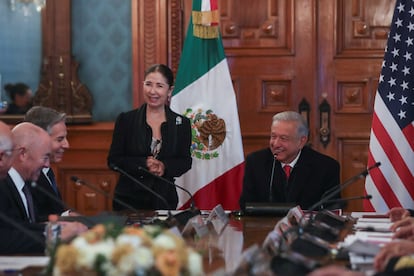The United States pressures Mexico to do more to solve the migration crisis
Mexican President López Obrador meets with U.S. Secretary of State Blinken and U.S. Secretary of Homeland Security Mayorkas as the situation on the border between the two countries reaches a fever pitch

This Wednesday, the President of Mexico, Andrés Manuel López Obrador, met with the U.S. Secretary of State, Antony Blinken, and the Secretary of Homeland Security, Alejandro Mayorkas, in Mexico City. The meeting occurred as dramatic images showed a caravan of thousands of migrants from Honduras, El Salvador, Venezuela and Haiti, among other countries of origin, crossing the country from south to north.
The senior U.S. officials, joined by White House Security Advisor Elizabeth Sherwood-Randall, arrived with a list of concrete requests, including the demand to divert some of the migrants to southern Mexico, increased control of the railroads migrants use to cross the country (among them, the train known as La Bestia [the Beast], a ruthless mode of transportation), and the suggestion that migrants be given incentives so that they do not continue their journey to the border, such as visas to remain in the countries they are passing through en route to the promise of a better life in the United States.
The meeting stemmed from a call last Thursday between López Obrador and U.S. President Joe Biden. In that conversation, both presidents agreed to the terms of the visit, as well as to reopening several border crossings that had been closed on an emergency basis amid the flood of people arriving at the border between the two countries. The average number of “encounters,” a euphemism that refers to the number of immigrant apprehensions by Border Patrol agents, reached an average of 9,600 per week at the beginning of December. Last Tuesday, the figure dropped somewhat, to 6,000.
In fiscal year 2023 (which runs through September, from the previous October), there were over 3.2 million “encounters,” a figure that has shattered all records, including 2022, which broke the previous record with 2.7 million apprehensions.
The migration crisis and border management have been a constant headache for Biden, who came to office with the promise of “humanizing” migrants and reversing the harsh policies of his predecessor, Donald Trump. Nearly three years later, the harsh reality of an unprecedented crisis has forced the president, who is seeking re-election next year in a campaign that will be defined by ideological warfare over these issues, to toughen his discourse. Perhaps the biggest sign of that change in attitude came in October, when the White House approved an expansion of the border wall, despite the fact that the Democratic leader campaigned for the presidency on the platform of abandoning one of Trump’s signature projects.
Mexico’s Secretary of Foreign Affairs, Alicia Bárcena, noted in a message that Mexico requested the bilateral meeting. On Wednesday, she will accompany President López Obrador “to discuss bilateral cooperation on human mobility, regular management of migratory flows and the expansion of legal channels for migration, with the rest of the Mexican and U.S. delegations,” according to a statement on the Ministry of Foreign Affairs’ social media. But the task will be more difficult, given that the United States’ demands for tackling this migratory crisis also affect the political problems it is causing domestically.
In Congress, the Republican Party has succeeded in linking military aid to Ukraine to tightening up border management. They seek to force the Biden administration to commit to granting asylum to no more than 5,000 people a day; strengthening the requirements so that immigrants must prove that a “credible danger” prevents them from returning to their countries; and equipping applicants with GPS monitors like the ones used in house arrests.
Last week, the U.S. Senate went on Christmas vacation after rushing to meet the deadlines to reach an agreement on such pressing issues. A solution to the problems on the southern border will have to wait until political activities resume. Meanwhile, the mayors of cities like Eagle Pass and El Paso in Texas and Yuma, Arizona, have asserted that they are overwhelmed by a crisis that also reaches New York, Chicago and Washington. For his part, hardline governor of Texas, Greg Abbott, has been chartering buses for months to send his state’s problems to Democratic strongholds.
Abbott just signed a law that allows the police to immediately deport undocumented immigrants. It is one of the toughest laws to be passed in the United States to date, and the Mexican president has condemned it.
Sign up for our weekly newsletter to get more English-language news coverage from EL PAÍS USA Edition
Tu suscripción se está usando en otro dispositivo
¿Quieres añadir otro usuario a tu suscripción?
Si continúas leyendo en este dispositivo, no se podrá leer en el otro.
FlechaTu suscripción se está usando en otro dispositivo y solo puedes acceder a EL PAÍS desde un dispositivo a la vez.
Si quieres compartir tu cuenta, cambia tu suscripción a la modalidad Premium, así podrás añadir otro usuario. Cada uno accederá con su propia cuenta de email, lo que os permitirá personalizar vuestra experiencia en EL PAÍS.
¿Tienes una suscripción de empresa? Accede aquí para contratar más cuentas.
En el caso de no saber quién está usando tu cuenta, te recomendamos cambiar tu contraseña aquí.
Si decides continuar compartiendo tu cuenta, este mensaje se mostrará en tu dispositivo y en el de la otra persona que está usando tu cuenta de forma indefinida, afectando a tu experiencia de lectura. Puedes consultar aquí los términos y condiciones de la suscripción digital.








































